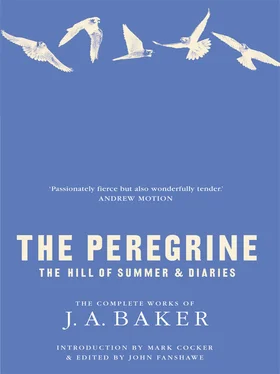The Hill of Summer & Diaries
The Complete Work of
Introduction by Mark Cocker & Edited by John Fanshawe


William Collins
An imprint of HarperCollins Publishers Ltd. 1 London Bridge Street London SE1 9GF
www.harpercollins.co.uk
The Peregrine © J. A. Baker, 1967
The Hill of Summer © J. A. Baker, 1969
The Diaries © J. A. Baker, 2010
On the Essex Coast © J. A. Baker, 1971. Published in RSPB Birds magazine 3 (II) (Sept/Oct, 1971): 281–283
Introduction © Mark Cocker, 2010
Diaries edited by John Fanshawe, 2010
Notes on J. A. Baker © John Fanshawe, 2011
Cover photographs © ImageBroker/Imagebroker/FLPA; Foto Natura Stock/FLPA; Malcolm Schuyl/FLPA; Dietmar Nill/naturepl.com; ImageBroker/Imagebroker/FLPA
Cover designed by Lee Motley
A catalogue record for this book is available from the British Library.
THE PEREGRINE. © Mark Cocker, 2010. All rights reserved under International and Pan-American Copyright Conventions. By payment of the required fees, you have been granted the nonexclusive, nontransferable right to access and read the text of this ebook on-screen. No part of this text may be reproduced, transmitted, downloaded, decompiled, reverse-engineered, or stored in or introduced into any information storage and retrieval system, in any form or by any means, whether electronic or mechanical, now known or hereinafter invented, without the express written permission of HarperCollins ebooks
HarperCollins Publishers has made every reasonable effort to ensure that any picture content and written content in this ebook has been included or removed in accordance with the contractual and technological constraints in operation at the time of publication
Source ISBN: 9780007395903
Ebook Edition © MAY 2011 ISBN: 9780007437382
Version: 2017-08-03
Cover
Title Page The Peregrine The Hill of Summer & Diaries The Complete Work of
Copyright
Introduction by Mark Cocker
Notes on J. A. Baker by John Fanshawe
The Peregrine
Beginnings
Peregrines
The Hunting Life
The Hill of Summer
April: Woods and Fields
May: A Storm
May: The Pine Wood
May: A Journey
May: Downland
June: Beech Wood
June: The Sea and the Moor
June: Midsummer
July: A River
July: The Heath
August: Estuary
September: The Hill
The Diaries
Introduction by John Fanshawe
1954–1961
On the Essex Coast
Acknowledgements
About the Publisher
Introduction by Mark Cocker
J.A. Baker (1926–1987) is now widely acknowledged as one of the most important British writers on nature in the twentieth century. When his first book, The Peregrine, appeared in 1967 with all the unexpected power and vertiginous daring of its eponymous bird, it was instantly recognised as a masterpiece. Today it is viewed by many as the gold standard for all nature writing and, in many ways, it transcends even this species of praise. A case could easily be made for its greatness by the standards of any literary genre.
It is more than 20 years since his untimely death in 1987, aged just 61, and more than four decades since the publication of his last and only other work, The Hill of Summer (1969). For much of the intervening period, neither of the books has been in print. Yet, if anything, Baker’s stock stands higher today than at any time. His writing has been intimately associated with the resurgence of literature on nature and landscape, the so-called New Nature Writing of authors like Tim Dee and Robert Macfarlane (the latter, in fact, has played a key role in Baker’s rediscovery). His books are studied as set texts at university. Major modern poets, from Kathleen Jamie to the former laureate Andrew Motion, acknowledge Baker’s poetic genius. Commentators of various stamp, from the film maker David Cobham to the TV presenter and wildlife cameraman Simon King, hail his influence upon them.
All of this is a remarkable achievement, particularly in view of Baker’s personal circumstances. He was an Essex man born and bred, living all of his days in what was then the small rural town of Chelmsford, largely at two addresses – 20 Finchley Avenue and 28 Marlborough Road. His parents, Wilfred and Pansy, were what might be called lower middle class; his father a draughtsman with the engineering company Crompton Parkinson. The formal education of their only son at Chelmsford’s King Edward VI School ended in 1943, when he was just sixteen years old. His abiding love for poetry and opera were perhaps exceptional in one of his social background, but Baker junior seems to have had little or no contact with other writers and artists. His only literary connections flowed from Collins’ eventual decision to publish The Peregrine and The Hill of Summer.
It is, in many ways, confirmation of his extraordinary talent that the author’s reputation rests entirely on two works – 350 published pages of prose – and in spite of their extremely narrow geographical focus. They describe a roughly rectangular Essex patch of just 550km 2, which includes the Chelmer Valley from the eastern edge of Chelmsford as far west as Maldon and the confluence of the Chelmer and Blackwater Rivers. At its heart lies Danbury Hill, the highest ground in Essex, with its glorious ancient woodlands of coppiced hornbeam and sweet chestnut. Baker country then runs down Danbury’s far slope and on to the southern and northern shores of the Blackwater Estuary, there to be extinguished in the dark silts at the North Sea‘s edge. Most of this countryside now lies within a commuter belt less than an hour from central London, yet in Baker’s day it was a deeply rural district. Residents of the beautiful village of Little Baddow recall how their doors were left unlocked at night until at least the 1970s. Between the dawn and dusk of a single winter’s day, Baker could traverse the whole area via a network of quiet country lanes. Throughout his life a bicycle was his only means of transport. He never learnt to drive a car.
This concentrated focus on one patch reminds us very much of the life and work of a historical writer such as Gilbert White, or perhaps the poet John Clare. Yet, simultaneously, the strict limit to his geographical explorations marks Baker out as a singularly important modern figure. In The Peregrine he wrote: ‘Before it is too late, I have tried to … convey the wonder of … a land to me as profuse and glorious as Africa.’ That he achieved this so brilliantly and excavated prose of such quality from what seems, on first acquaintance, a modest landscape, throws down the gauntlet to our own age. For a society now deeply sensitive to the issue of carbon usage, Baker is surely a shining example. His bicycle-bounded territory is a model for future writers. His books strip back from the word ‘parochial’ its accreted, pejorative associations of narrowness and conservatism. He is parochial only in its truest sense. He illuminated the rich mysteries to be found in every parish in these islands.
His two books on Essex landscape and wildlife are intimately connected with one another in terms of their style and content. They are, in some ways, very simple. They are books of encounter. They describe the wild animals, particularly the birds, that Baker saw and heard when he was out. They both draw upon his relentless foraging across the same landscape. However, while The Hill of Summer is a generic description of all his wildlife encounters between the seasons of spring and autumn, The Peregrine is distinguished by its close focus on one species, the fastest-flying bird on Earth.
Читать дальше














